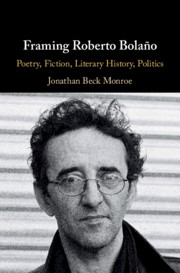Book contents
- Framing Roberto Bolaño
- Framing Roberto Bolaño
- Copyright page
- Dedication
- Contents
- Acknowledgments
- Abbreviations
- Introduction Unpacking Bolaño’s Library
- Part One
- Part Two
- Part Three
- Part Four
- Chapter 9 Literary Taxonomies after the Wall
- Chapter 10 “What a Relief to Give Up Literature”
- Conclusion From the Known to the Unknown University
- Notes
- Index
Chapter 9 - Literary Taxonomies after the Wall
Woes of the True Policeman (Los sinsabores del verdadero policía)
from Part Four
Published online by Cambridge University Press: 09 September 2019
- Framing Roberto Bolaño
- Framing Roberto Bolaño
- Copyright page
- Dedication
- Contents
- Acknowledgments
- Abbreviations
- Introduction Unpacking Bolaño’s Library
- Part One
- Part Two
- Part Three
- Part Four
- Chapter 9 Literary Taxonomies after the Wall
- Chapter 10 “What a Relief to Give Up Literature”
- Conclusion From the Known to the Unknown University
- Notes
- Index
Summary
Begun in the late 1980s, but appearing only in 2011, a year after The Third Reich and seven years after the monumental 2666, Bolaño’s third posthumously published novel, Woes of the True Policeman, pivots decisively from the ideological conflicts of the twentieth century to a pronounced post-Cold War emphasis on questions of identity. Reframing Bolaño’s investigation of what counts, and what doesn’t, as poetry, as an inquiry into the elaboration of literary taxonomies and the aesthetics and politics of their particular ways of making visible, it orients its concerns with genre, gender, sexuality, and identity after “The Fall of the Berlin Wall” (the title of its opening chapter) toward a profound questioning of what progress we may claim to have made in negotiating conceptual, epistemological, ideological binaries. Through its central characters, the Chilean, Spanish, Mexican literature professor Óscar Amalfitano (who appears in 2666 as professor of philosophy), Amalfitano’s former lover, the poet turned novelist Juan Padilla, and the writer J.M.G. Arcimboldi (2666’s Benno von Archimboldi), Bolaño explores the degree to which, post -1989, post-9/11, in reimagining poetry, the novel, history, literary history, ideology, and politics, we may find it possible to develop a poetics of apposition rather than opposition.
Keywords
- Type
- Chapter
- Information
- Framing Roberto BolañoPoetry, Fiction, Literary History, Politics, pp. 155 - 172Publisher: Cambridge University PressPrint publication year: 2019

